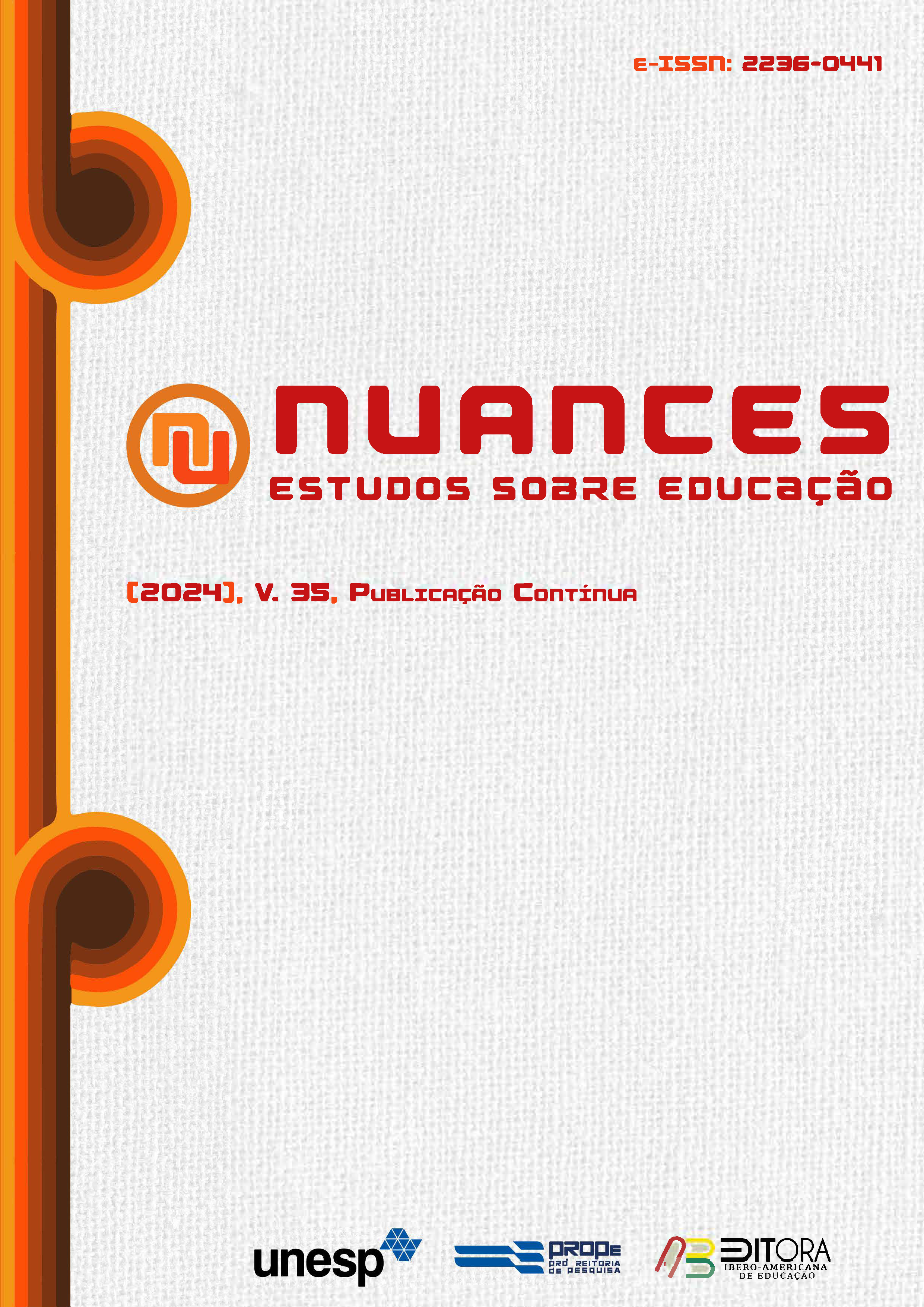Reflections on the BNCC in Elementary Education
Conceptual approach to the cognitive dimension and the need for metamorphosis
DOI:
https://doi.org/10.32930/nuances.v35i00.10407Keywords:
BNCC, Elementary school, Basic schooling, Cognitive dimensionAbstract
Proposed as part of a broader study and in pursuit of theoretical deepening, this work questions, discusses, and reflects on some concepts and foundations presented by the BNCC regarding structural issues and the current school model. In this direction and sense, the text seeks, in the light of a reflective theoretical exploration, to analyze the complexity of this instrument, both conceptually and as a guideline for primary schooling, guiding pedagogical practices in the daily routine of schooling. It considers an inevitable incompleteness due to the gap between its idealized formulation and the structural reality in which it will be applied, since it was instituted to ensure the learning and development rights of students, in accordance with the National Education Plan. The conceptions of learning and development oriented by ethical, political, and aesthetic principles that aim at integral human formation and the construction of a just, democratic, and inclusive society impose a strong critical stance due to their operational complexity and the insufficiency of the institutional model in the face of the educational system's "desire," at its limit, to continuously seek to overcome inequalities in schooling and its effectiveness in the school unit by these principles.
Downloads
References
BENINI, S.; PETTIGNANO, M. Transizioni nella prima infanzia: entrata nella Scuola dell’infanzia e passaggio alla Scuola elementare. Le prospettive di docenti e genitori. Locarno, Italia, 2020.
BERNSTEIN, B. Pedagogy, symbolic control and identity: theory, research, critique. London: Taylor & Francis, 1996.
BERNSTEIN, B. Pedagogy, Symbolic Control and Identity: Theory, Research, Critique. London: Rowman & Littlefield Publishers, 2000.
BRASIL. Lei n. 9.394, de 20 de dezembro de 1996. Estabelece as Diretrizes e Bases da Educação Nacional. Presidência da República. Diário Oficial da União: seção 1, Brasília, DF, p. 27833, 1996.
BRASIL. Ministério da Educação. Parecer CNE/CEB n. 11/2010, aprovado em 7 de julho de 2010. Diretrizes Curriculares Nacionais para o Ensino Fundamental de 9 (nove) anos. Brasília, DF: MEC, 2010. Disponível em: http://portal.mec.gov.br/index.php?option=com_docman&task=doc_download&gid=6324&Itemid=. Acesso em: 7 dez. 2023.
BRASIL. Ministério da Educação. Diretrizes Curriculares Nacionais da Educação Básica. Brasília, DF: MEC; SEB; DICEI, 2013. Disponível em: http://portal.mec.gov.br/index.php?option=com_docman&view=download&alias=13448-diretrizes-curiculares-nacionais-2013-pdf&Itemid=30192. Acesso em: 7 dez. 2023.
BRASIL. Lei n. 13.005, de 25 de junho de 2014. Aprova o Plano Nacional de Educação - PNE e dá outras providências. Brasília, DF: Câmara dos Deputados, Edições Câmara, 2014. Disponível em: https://www.planalto.gov.br/ccivil_03/_ato2011-2014/2014/lei/l13005.htm. Acesso em: 7 dez. 2023.
BRASIL. Ministério da Educação. Conselho Nacional de Educação. Parecer CNE/CP n. 15/2017. Base Nacional Comum Curricular (BNCC). Brasília, DF: MEC; CNE, 2017. Disponível em: http://portal.mec.gov.br/docman/dezembro-2017-pdf/78631-pcp015-17-pdf/file. Acesso em: 7 dez. 2023.
BRASIL. Ministério da Educação. Base Nacional Comum Curricular. Brasília, DF: MEC, 2018.
CACIOPPO J. T.; PETTY R. E. The need for cognition. Journal of Personality and Social Psychology, [S. l.], v. 4, n. 1, p. 116–131, 1982. DOI: 10.1037/0022-3514.42.1.116. Disponível em: https://psycnet.apa.org/record/1982-22487-001. Acesso em: 7 dez. 2023.
CACIOPPO, J. T.; PETTY, R. E. Central and peripheral route sto persuasion: The role of message repetition. In: ALWITT, L.; MITCHELL, A. (ed.). Psychological processes and advertising effects. Hillsdale: Lawrence Erlbaum, 1985.
CACIOPPO, J. T.; PETTY, R. E. Communication and persuasion: Central and peripheral routes to attitude change. New York: Springer Verlag, 1986.
JAFFRO, L. Habermas et le sujet de la discussion. Dans Cités, [S. l.], v. 1, n. 5, p. 71-85, 2001. Disponível em: https://www.cairn.info/revue-cites-2001-1-page-71.htm. Acesso em: 7 dez. 2023.
KASTRUP, V. O funcionamento da atenção no trabalho do cartógrafo. In: PASSOS, E.; KASTRUP, V.; ESCÓSSIA, L. (org.). Pistas do método da cartografia: pesquisa-intervenção e produção de subjetividade. Porto Alegre: Sulina, 2009. 207 p.
LEMES, S. S. Os Estilos Cognitivos: dependência e independência de campo- na formação e no desempenho acadêmico em duas áreas de conhecimento: exatas e humanas. 1998. Tese (Tese de Doutorado) – Universidade de São Paulo, São Paulo, 1998.
MORIN, E. Eloge de la métamorphose. Pour éviter la désintégration du "système Terre, il faut d'urgence changer nos modes de pensée et de vie, estime le sociologue. Le monde, [S. l.], 2010. Disponível em: https://www.lemonde.fr/idees/article/2010/01/09/eloge-de-la-metamorphose-par-edgar-morin_1289625_3232.html. Acesso em: 7 dez. 2023.
NÓVOA, A. Escolas e Professores: Proteger, Transformar, Valorizar. Salvador: SEC/IAT, Bahia, 2022.
PENNINGS, A. H.; SPAN, P. Estilos cognitivos e estilos de aprendizagem. In: ALMEIDA, L. S. Cognição e aprendizagem escolar. Porto, Portugal: Apport, 1991.
RENABE. Relatório Nacional de Alfabetização Baseada em Evidências. Brasília, DF: MEC/Sealf, 2020. Disponível em: https://www.gov.br/mec/pt-br/media/acesso_informacacao/pdf/RENABE_web.pdf. Acesso em: 7 dez. 2023.
SMITH, J. D. Estilos de aprendizagem na educação de adultos. Revista Portuguesa de Pedagogia, Coimbra, ano 24, n. 1, p. 317-43, 1990.
YOUNG, M. Alternative education futures for a knowledge society. In: EUROPEAN COUNCILL FOR EDUCATIONAL RESEARCH CONFERENCE, 2009. Proceedings […]. Vienna: Austria, 2009a.
YOUNG, M. Education, globalization and the ‘voice of knowledge’. Journal of Education and Work, [S. l.], v. 22, p. 193-204, 2009b. DOI: 10.1080/13639080902957848. Disponível em: https://www.tandfonline.com/doi/full/10.1080/13639080902957848. Acesso em: 7 dez. 2023.
YOUNG, M.; MULLER, J. Três cenários educacionais para O futuro: lições da sociologia do conhecimento. Tradução: Jessé Rebello. Est. Aval. Educ., São Paulo, v. 27, n. 65, p. 522-551, 2016. Disponível em: https://dialnet.unirioja.es/descarga/articulo/5619756.pdf. Acesso em: 10 dez. 2023.
Downloads
Published
How to Cite
Issue
Section
License
Copyright (c) 2024 Nuances: estudos sobre Educação

This work is licensed under a Creative Commons Attribution-NonCommercial 4.0 International License.
Atribuição-NãoComercial
CC BY-NC
Esta licença permite que outros remixem, adaptem e criem a partir do seu trabalho para fins não comerciais, e embora os novos trabalhos tenham de lhe atribuir o devido crédito e não possam ser usados para fins comerciais, os usuários não têm de licenciar esses trabalhos derivados sob os mesmos termos.





